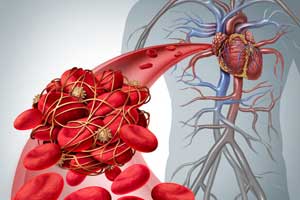- Home
- Editorial
- News
- Practice Guidelines
- Anesthesiology Guidelines
- Cancer Guidelines
- Cardiac Sciences Guidelines
- Critical Care Guidelines
- Dentistry Guidelines
- Dermatology Guidelines
- Diabetes and Endo Guidelines
- Diagnostics Guidelines
- ENT Guidelines
- Featured Practice Guidelines
- Gastroenterology Guidelines
- Geriatrics Guidelines
- Medicine Guidelines
- Nephrology Guidelines
- Neurosciences Guidelines
- Obs and Gynae Guidelines
- Ophthalmology Guidelines
- Orthopaedics Guidelines
- Paediatrics Guidelines
- Psychiatry Guidelines
- Pulmonology Guidelines
- Radiology Guidelines
- Surgery Guidelines
- Urology Guidelines
Risk of VTE increases after discontinuation of anticoagulant treatment: BMJ

Risk of symptomatic recurrent venous thromboembolism increases after discontinuation of anticoagulant treatment revealed a BMJ study. The study pointed out that over one-third of patients with an initial unprovoked venous thromboembolism (VTE) who discontinue anticoagulation could experience a recurrence over the next 10 years.
A team of researchers at the University of Ottawa conducted a systematic review and meta-analysis to determine the rate of a first recurrent venous thromboembolism (VTE) event after discontinuation of anticoagulant treatment in patients with the first episode of unprovoked VTE, and the cumulative incidence for recurrent VTE up to 10 years.
Two investigators independently screened studies, extracted data, and appraised risk of bias. Data clarifications were sought from authors of eligible studies. Recurrent VTE events and person-years of follow-up after discontinuation of anticoagulant treatment were used to calculate rates for individual studies, and data were pooled using random-effects meta-analysis. Sex and site of initial VTE were investigated as potential sources of between-study heterogeneity.
Key findings
- 18 studies involving 7515 patients were included in the analysis.
- The pooled rate of recurrent VTE per 100 person-years after discontinuation of anticoagulant treatment was 10.3 events in the first year, 6.3 in the second year, 3.8 events/year in years 3-5, and 3.1 events/year in years 6-10.
- The cumulative incidence for recurrent VTE was 16% at 2 years, 25% at 5 years, and 36% at 10 years.
- The pooled rate of recurrent VTE per 100 person-years in the first year was 11.9 events for men and 8.9 events for women, with a cumulative incidence for recurrent VTE of 41% and 29%, respectively, at 10 years.
- Compared to patients with isolated pulmonary embolism, the rate of recurrent VTE was higher in patients with proximal deep vein thrombosis and in patients with pulmonary embolism plus deep vein thrombosis.
- In patients with distal deep vein thrombosis, the pooled rate of recurrent VTE per 100 person-years was 1.9 events in the first year after anticoagulation had stopped.
- The case fatality rate for recurrent VTE was 4%.
Based on the findings, the authors concluded that " In patients with a first episode of unprovoked VTE who completed at least three months of anticoagulant treatment, the risk of recurrent VTE was 10% in the first year after treatment, 16% at two years, 25% at five years, and 36% at 10 years, with 4% of recurrent VTE events resulting in death. These estimates should inform clinical practice guidelines, enhance confidence in counseling patients of their prognosis, and help guide decision making about long term management of unprovoked VTE."
For further reference, click on the link
doi: https://doi.org/10.1136/bmj.l4363

Disclaimer: This site is primarily intended for healthcare professionals. Any content/information on this website does not replace the advice of medical and/or health professionals and should not be construed as medical/diagnostic advice/endorsement or prescription. Use of this site is subject to our terms of use, privacy policy, advertisement policy. © 2020 Minerva Medical Treatment Pvt Ltd